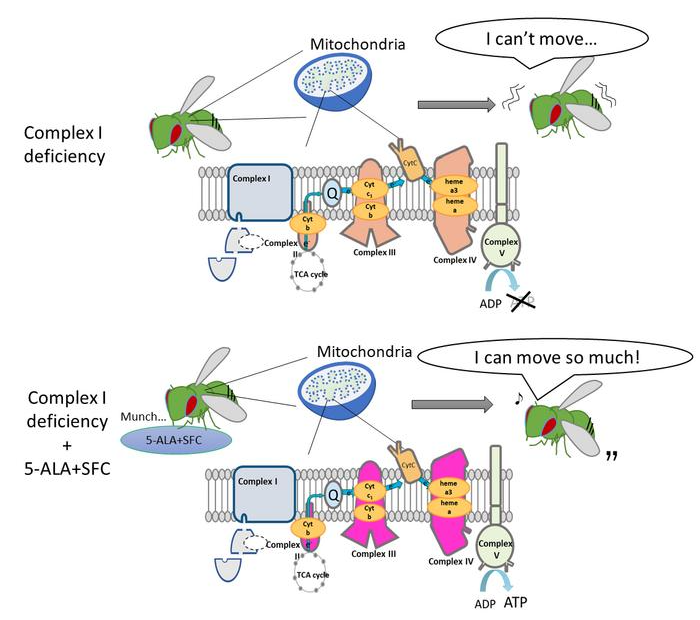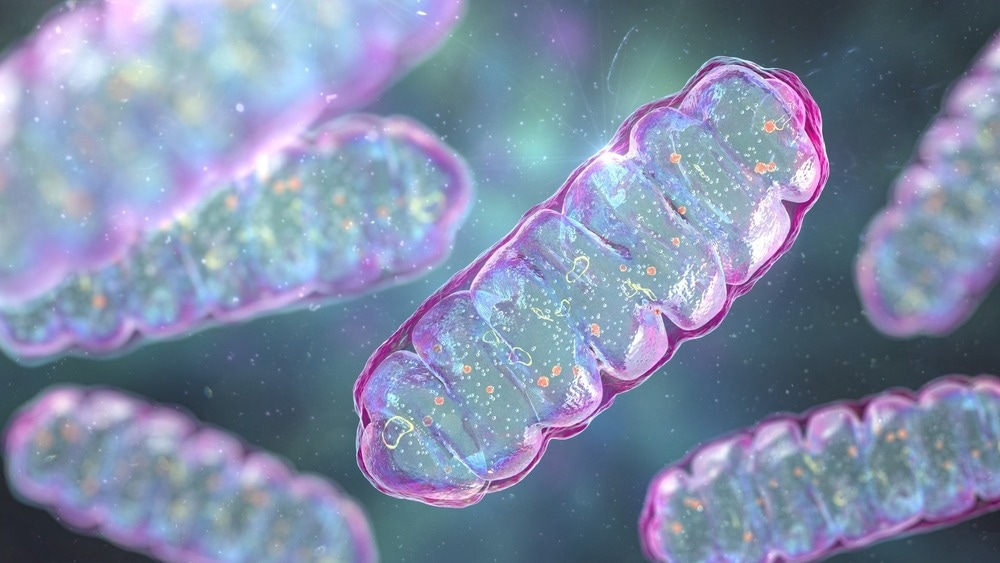Reviewed by Danielle Ellis, B.Sc.Jul 17 2023
At the Tokyo Metropolitan University, researchers have shown that 5-aminolevulinic acid (5-ALA) aids bypass deficiencies in Complex I (CI), the first in a series of protein complexes that transport electrons and assist in powering the mitochondria.
 Flies with Complex I deficiency cannot activate the cascade of reactions required to make ATP. When fed 5-ALA+SFC, other protein complexes such as Complex II and IV are more active and help bypass the lack of CI. Image Credit: Tokyo Metropolitan University.
Flies with Complex I deficiency cannot activate the cascade of reactions required to make ATP. When fed 5-ALA+SFC, other protein complexes such as Complex II and IV are more active and help bypass the lack of CI. Image Credit: Tokyo Metropolitan University.
They displayed that fruit flies missing the analogous protein showed enhanced health when provided a cocktail of drugs such as 5-ALA. CI deficiency is accountable for the majority of mitochondrial disorders; the team’s findings may result in new therapies.
Mitochondrial diseases emerge from issues in the mitochondria, a small organelle in cells that generates adenosine triphosphate (ATP), a chemical fuel that influences an extensive range of biochemical processes in human bodies.
Especially, issues are acute in highly energy-intensive parts of the body like the brain and muscles, leading to severe issues like lactic acidosis, mitochondrial encephalopathy, and stroke-like episodes (MELAS) syndrome, known as a debilitating condition. Regrettably, there is no cure available at present: researchers around the globe continue to be on the lookout for effective treatments.

Image Credit: Kateryna Kon/Shutterstock.com
Complex I (CI) deficiency is known as a common cause of mitochondrial disorders. Complex I is the first of a series of protein complexes that assist the transport of electrons to power reactions in the mitochondria, which eventually results in ATP production.
But this is not the only way in which ATP is made; it is familiar that Complex II, III, IV, and cytochrome c could also offer electrons to the same process, but if this could be leveraged to counteract CI deficiency was unidentified.
Currently, a research group headed by Associate Professor Kanae Ando of Tokyo Metropolitan University has displayed that some chemical supplements may assist in selectively boosting CII and CIV to bypass the lack of CI.
They studied fruit flies with their corresponding CI artificially minimized by genetic engineering; flies with this genetic “knockdown” displayed issues with their movement and shorter lifespans.
But they discovered that feeding them a mixture of 5-aminovulenic acid and sodium ferrous citrate (SFC) assisted in enhancing their locomotor functions and neuromuscular junction development. Also, levels of ATP were considerably enhanced, but this was not a result of any elevation in the amount of CI.
On closer examination, the research group observed that activities of Complex II and IV were elevated and assisted bypass the problems linked to CI deficiency. 5-ALA is considered to be a precursor to heme, a crucial part of the function of Complex II, III, IV, and cytochrome c.
On being fed 5-ALA, the fruit flies displayed a metabolic shift that utilized the potential of CII and CIV to transport electrons and also power ATP production.
Also, they observed that flies with CI deficiency had high levels of lactate and pyruvate in their cells, similar to human patients with CI deficiency experiencing lactic acidosis. 5-ALA helped bring down the levels of both.
Despite the intensity of mitochondrial disorders, there is no treatment so far that fulfills the root cause of the extensive array of health issues they might cause. The outcomes of the team promise not only new knowledge but possibly new therapeutic options for a whole class of deadly diseases.
Source:
Journal reference:
Nozawa, N., et al. (2023) 5-Aminolevulinic acid bypasses mitochondrial complex I deficiency and corrects physiological dysfunctions in Drosophila. Human Molecular Genetics. doi.org/10.1093/hmg/ddad092.